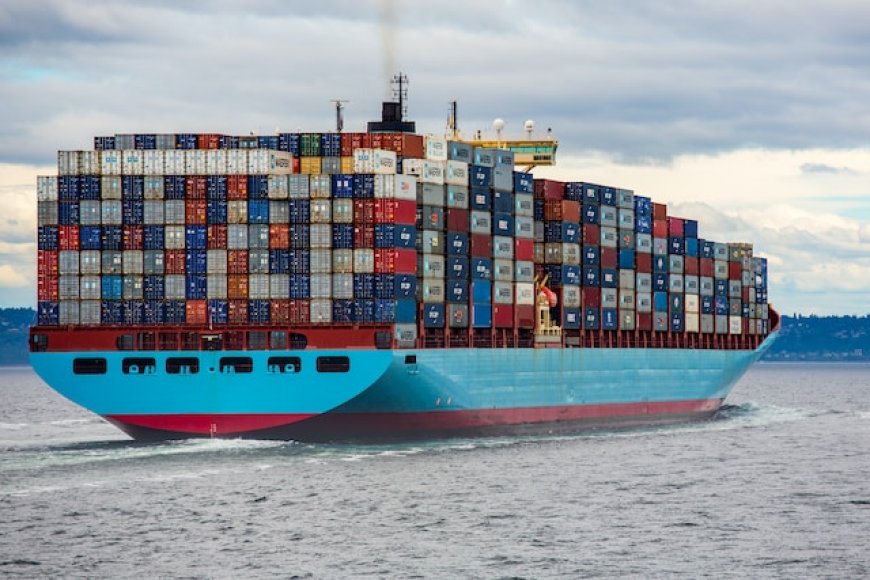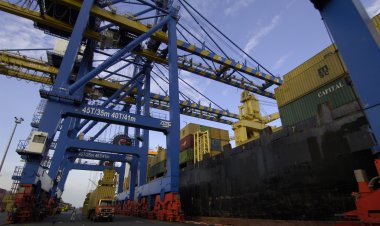This article is a part of a series of special thought pieces published by APRI in collaboration with the Deutsche Afrika Stiftung e.V. Dr. Melanie Müller and Dr. Olumide Abimbola edited the article, which is part of the "What is Germany’s Africa Policy?" series.
Summary
- Germany is struggling to adapt to an increasingly multipolar present and Africa’s resources are moving up the agenda.
- For decades, Germany has been a geoeconomic power because its foreign policy was light and consisted mainly of softly paving the way for the export success of its large corporations and small and medium-sized companies.
- The crisis within the Western-dominated international order is an opportunity for African governments, businesses, and the people to strike deals that are more in the people’s interest.
- Developing a Pan-African industrial policy that couples domestic resource mobilisation with a strategy of regional complementarities is key.
- German foreign economic policy should plug into these strategies to move beyond moral rhetoric and actually contribute to a more just trade order.
Background
Germany is struggling to adapt to an increasingly multipolar present. Caught between an expansionist and potentially unstable Russia, a more assertive China to the East, and a flailing US hegemon across the Atlantic to the West, it is under intense pressure to build better relationships with Africa, Asia, and South and Central America. The core challenge of Germany’s trade and investment policy in Africa has been finding a balance between supporting corporate profit interests and a rhetorically moral approach to foreign and development policy. Given the entrenched nature of its exportist development model and its tradition of foreign policy moralism (Neumann 1944:193), this challenge will remain for years to come.
It is this tension that I seek to discuss in this paper in order to propose ways of making German trade policy with the African continent more adequate and just.
For decades, Germany has been the ‘paradigmatic geoeconomic’ power (Kundnani 2016) because large corporate and small and medium-sized enterprises’ interests abroad were the natural centre of economic relations with the wider world. Apart from a few military ventures in Afghanistan and across the African continent (Berndt 2023; Koddenbrock and Mertens 2022), Germany’s interaction with the world was mostly through trade and, on the European continent, the protection of its ‘exportist’ political economy through European integration processes and the hawkish management of the Euro.
Ties built with Russia and China to the advantage of large German corporations were added to this geoeconomic and rather ‘economistic’ approach to global trade and investment. Foreign economic policy was anti-moral and often in the interest of the largest corporations such as BASF, Volkswagen, Bayer, and Siemens, who were busy investing according to their profit motive. The ‘Mittelstand’, that is Germany’s small and medium-sized enterprises (SMEs), often leaders in the export of specific machinery (parts), followed in their wake.
More recently, a stronger emphasis on morality has surfaced, i.e. a safeguarding of the ‘international rules-based order’ and protecting human rights and a limiting of trade relationships to ‘right’ and ‘adequate’ partners. This move has resulted from the advent of a large-scale war close to its territory and a decrease in the reliability of established trade relations because the deals with German corporations are not as profitable as those with other trading partners such as China, India, Turkey, Qatar, Saudi Arabia, or Brazil. It is currently mainly being driven by the Foreign Ministry under Green foreign secretary Annalena Baerbock.
While this shift may seem like a personal episode linked to political style, a specific political economy is at its heart: building relationships with everyone is no longer necessarily the most promising and profitable option. It now appears more opportune to focus on some countries and their corporations who will reliably protect German interests. Hedging against the risk of asset seizures and the ‘weaponisation of trade’ (Farell and Newmann 2022; Findeisen 2023) has become a real concern. A divergence of interest between different sectors of the German capital and large and SME businesses is telling in this regard. How to make the best profit is no longer clear – through free trade, protectionism, and/or re-shoring. It is clear, however, that German business can no longer neglect the Global South.
The biggest interest group of the large German corporations, the Bundesverband der Deutschen Industrie (BDI), for example, is seeking ways to make a ‘fresh start’ in German-African relations.
This more open field of political and economic possibilities constitutes an opportunity for African governments, businesses, and the people they sometimes genuinely try to represent to strike deals that are more in the people’s interest. However, the notion of ‘popular interests’ is not a trivial one. All policies have winners and losers and are for someone. The biggest question from the perspective of the broader African population is, thus, which models of the economy (Sylla 2023) and social reproduction (Ossome 2022) specific government deals and policies pursue and who profits from them.
In this paper, I first provide an overview of existing German involvement in trade and investment on the African continent. In the second step, I present some recent progressive policies on development on the African continent in order to arrive, in the third part, at conclusions on how German trade policy could look to support these progressive policies.
Germany’s trade and investment on the African continent
In quantitative terms, German Foreign Direct Investment (FDI) on the African continent has been small, with 1.6. billion USD in 2021. Some companies, however, have sizable investments and production sites on the continent. Volkswagen, for example, has long had an important production site in South Africa, and it has recently added a new one in Ghana. Cooperation with several apartheid governments has been part of this joint trade and production history. BASF, the chemical giant that had continued to buy 50% of the annual platinum production from the British-Lonmin-run Marikana mine in 2012 (Becker et al. 2018), has also been active in South Africa with little worry about the morality of its business, a routine that jars with the moral rhetoric of German foreign policy.
According to data from the Observatory of Economic Complexity, the five most important trading partners between 2010 and 2021 (based on UN Comtrade data) were Algeria, Liberia, Chad, Botswana, and Equatorial Guinea for imports and Liberia, Eritrea, Rwanda, Cape Verde, and South Africa for exports. In the past, oil and minerals for imports and machinery and chemicals for exports have dominated the trade relations Germany has entered with the African continent. This trading pattern may change. In the frenzy for Liquefied Natural Gas (LNG) supply, contrary to previous announcements about the need for a green transition, Senegal, for example, may become an important trading partner with whom sizable prospective trade volumes in LNG have been discussed. A gas pipeline to Europe from Nigeria via Niger and Algeria (with its recent coup government) was on the agenda of Chancellor Scholz’s recent visit to Nigeria. Africa holds fossil promises for a German diversified gas supply.
With several small-scale initiatives such as the Compact with Africa (Banse 2022), past German governments have sought to entice the German Mittelstand to invest more in the African continent. Overall, however, Germany’s political and economic footprint has been light in recent decades. With the need for more direct economic relations and more state direction, the size of this footprint will need to change and the ideology behind any new kind of relation will be crucial.
African development models
Organising the departure from post-colonial and extractivist economic development models on the African continent has been extremely difficult and crisis-prone. While the developmentalist state was in high regard in the early postcolonial years in the 1960s and 1970s, that enthusiasm waned when the 1980s debt crisis and IMF-imposed structural adjustment led to two lost decades from which many African countries are still recovering. With the climate crisis, the need to organise a just and green transition and the reappearance of large-scale government spending have meant the return of new models of economic development that go beyond the liberal credo of open markets for those countries that would have profited from some degree of protectionism. Protectionism has a long lineage, with the Prussian thinker Friedrich List being one of the most well-known. The Chinese state-directed path to economic development has played a major role in this ideological and material shift.
Developing a Pan-African industrial policy that couples “domestic-resource mobilisation” (Sylla 2023) with the search for and a strategy of regional complementarities would be key to further steps in a more state-directed developmentalism that overcomes some of the limitations of overt reliance on private and often foreign corporations. As a recent report on Just Transition Africa – A Climate, Energy and Development Vision for Africa” written by influential African economists argued: “With strategic investments using one’s own currency, know-how, and materials to strengthen key areas in the economy (such as agriculture, energy, housing, transportation, etc), it is possible to direct investment to boost productive capacity” (Sokona et al 2023: 66). Important parts of the report, however, continue to be dedicated to a reform of the international financial architecture and more equitable financial flows. This focus shows that mobilising domestic resources in a situation of cyclical debt crisis and import/export dependency will be a long-term project rather than one to be implemented in a few years.
The AfCFTA process, devised and initiated during the last throes of neoliberalism, has the potential to harness a progressive Pan-African vision if its new development ideas, based on national resources and regional complementarities, are taken into account more seriously. If the AfCFTA process contributes to more regional infrastructure cooperation and strategic cooperation for more complex industrial production, it could avert a repetition of more of the same export-oriented and raw commodity-focused strategy.
Conclusion: A new mode of relation – Just trade supporting regional complementarities
Thanks to the necessary regulations for cheap labour at home and an undervalued Euro, the German government has managed to support domestic business over the last two decades of the boom. This model is coming to an end, and new policies are being developed to make German corporations more innovative and profitable in the face of increasing global competition. At the same time, due to the return of international warfare to the European continent, novel reflections on morality and violence have entered the discourse on Germany's national interest and geoeconomic approach to relating to the world.
It is in this context that the various German ministries’ approaches to trade and investment with the African continent could meaningfully contribute to increasing African self-determination and wealth. But this contribution is only possible with a clear idea of what a meaningful industrial policy at the continental, regional, and for each of the 55 African states would entail. The old models have failed most African countries, and if the German government is really interested in a more moral foreign economic policy, it would have to make its credit and regulatory tools support corporate practices that benefit the majority of the people.
It would be naive to expect the relevant German ministries (the Ministry for Economic Cooperation and Development, the Ministry of Climate and Economics, the Ministry of Defense or the Foreign Ministry) to pursue a coherent set of policies towards African countries. This has been visible both in the EU’s new Africa strategy, the China strategy, the updates of the national resource strategy, and the attempts to devise new approaches to critical minerals (see Findeisen 2023). Instead, the key would be to develop policies that support German businesses in linking into ongoing attempts to increase African economic self-determination through domestic resource mobilisation and regional complementarities.
With re-shoring and the weaponisation of trade turning into a regular feature of world trade, African governments will increasingly seek ways to organise regionally, extract better terms within global value chains, and make the most of the resources with which they are domestically endowed. In the face of a history of colonialism and lopsided trade agreements that favour unprocessed raw materials exports, it is time for German policymakers at home and within the EU to reverse course and support trade agreements and governance mechanisms that allow African governments and business to increase their relative share in the profits made and to transform their economies away from raw materials’ exports structurally.
The newly transparent German and European dependencies on the minerals that are abundant on the African continent provide a crucial moment of opportunity. We can now observe in real time whether Germany continues down its classic geoeconomic route of securing cheap inputs for its corporations. We should also be attentive to whether it adopts a more just approach to foreign economic policy. That approach would entail becoming interested in more equitable trade and reducing wealth inequalities between Africa and Europe. Morality matters not only when deciding about the use of force in the event of war but also when confronting the inequalities and dependencies to which our corporations and government policies actively contribute.
Selected Bibliography
Banse, Frauke (2022). Private Sector Support for Development, https://www.brot-fuer-die-welt.de/fileadmin/mediapool/blogs/Mari_Francisco/Banse_Privatinvestitionen_Analyse99.pdf
Becker, Britta, Grimm, Maren & Krameritsch, Jakob (Eds.) (2018). Zum Beispiel: BASF – Über Konzernmacht und Menschenrechte. Mandelbaum Verlag.
Berndt, Michael (2023). Objektive Interessen in der deutschen Außenpolitik: Eine kritische Analyse. Springer.
Findeisen, Francesco (2023) The Club Approach: Towards Successful EU Critical Raw Materials Diplomacy. Jacques Delors Institute. https://www.delorscentre.eu/en/publications/critical-raw-materials-club#:~:text=One%20option%20is%20the%20'Club,what%20this%20entails%20in%20practice.
Germann, Julian (2023) Global rivalries, corporate interests and Germany’s ‘National Industrial Strategy 2030’, Review of International Political Economy, 30:5, 1749-1775, DOI: 10.1080/09692290.2022.2130958
Koddenbrock, Kai and Mertens, Daniel (2022) Geoeconomics and National Production Regimes, in: Babic, Milan et al. (2022) The political economy of Geoeconomics. Palgrave. available online: https://link.springer.com/chapter/10.1007/978-3-031-01968-5_6
Kundnani, Hans (2016) German Power. Das Paradox der deutschen Stärke. CH Beck.
Mkandawire, Thandika (2001). Thinking about developmental states in Africa. Cambridge Journal of Economics, 25(3), 289–313. http://www.jstor.org/stable/23600389
Neumann, Franz (2009 [1942]). Behemoth – Structure and Practice of National Socialism. Oxford University Press. Nölke, Andreas (2021). Exportismus – Die deutsche Droge. Westend
Ossome, Lyn (2022) Introduction: The social reproductive question of land contestations in Africa, African Affairs, 121(484). pp e9–e24, https://doi.org/10.1093/afraf/adab032
Schneider, Etienne (2023) Germany’s Industrial strategy 2030, EU competition policy and the Crisis of New Constitutionalism. (Geo-)political economy of a contested paradigm shift, New Political Economy, 28:2, 241-258, DOI: 10.1080/13563467.2022.2091535
Sokona, Yocouba (2023) Just Transition: A climate energy and development vision for Africa, available at: https://justtransitionafrica.org/wp-content/uploads/2023/05/Just-Transition-Africa-report-ENG_single-pages.pdf
Sylla, Ndongo (2023) For a Full and Decent Employment in Africa:The Role of a Job Guarantee, Open Society University Network Economic Democracy Initiative, Policy Report 2023(1), https://edi.bard.edu/research/notes/for-a-full-and-decent-employment-in-africa-the-role-of-a-job-guarantee
Tayo, Teniola (2023). Harnessing the Afcfta for increased investment in Africa, available at: https://afripoli.org/harnessing-the-afcfta-for-increased-german-investment-in-africa
About the Author
Prof. Dr. Kai Koddenbrock
Kai Koddenbrock is a professor of political economy at Bard College Berlin. He is working on economic sovereignty and self-determination in the Global South and particularly on the role of the international monetary system and global and domestic financial markets in helping and constraining this quest. Located at the intersections of international relations and international political economy, he also works on geopolitics and geoeconomics and the new scramble for rare earths.




